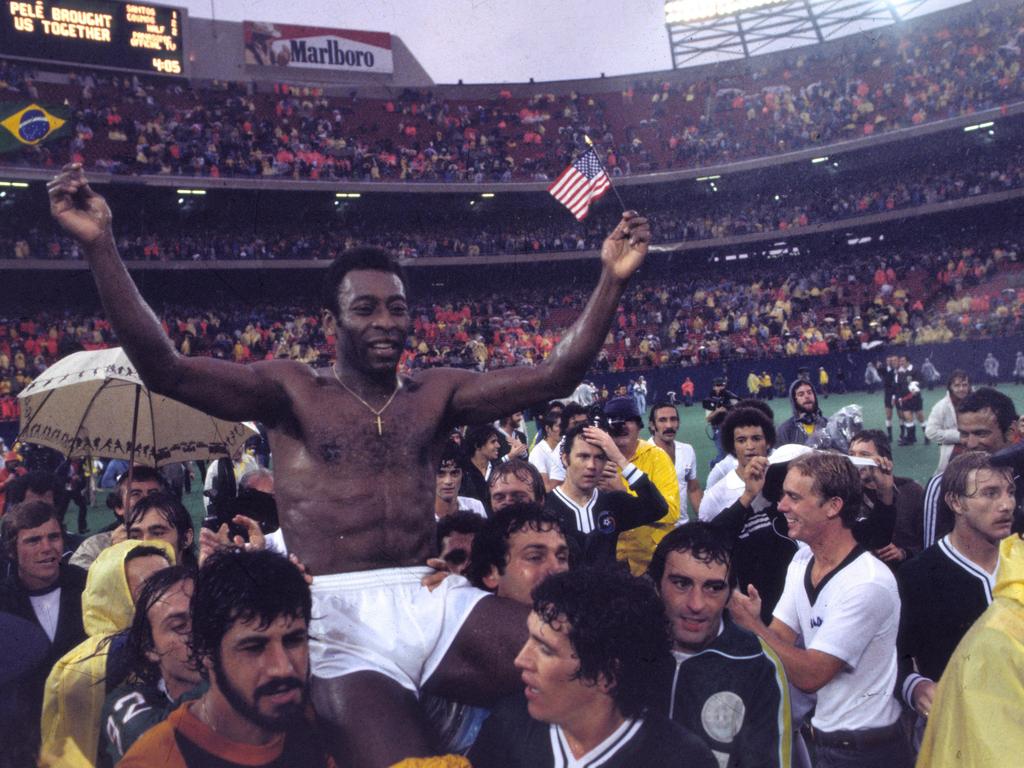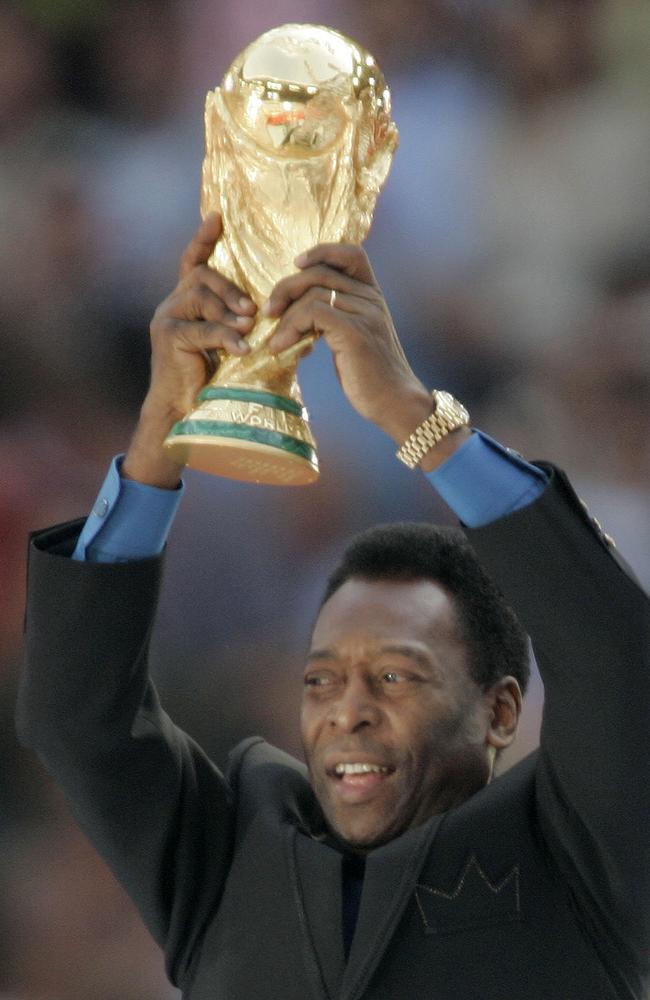This article is more than
3 year old‘Entire world in pain’: Heartbreaking photos as Pele dies aged 82
Footballing icon Pele has lost his battle with cancer.
The Brazil star’s family confirmed he died on Friday (AEDT) at age 82.
“Inspiration and love marked the journey of King Pele, who peacefully passed away today,” a statement read.
“On his journey, Edson enchanted the world with his genius in sport, stopped a war, carried out social works all over the world and spread what he most believed to be the cure for all our problems: love.
“His message today becomes a legacy for future generations. Love, love and love, forever.”
Family members had been gathering at a Sao Paulo hospital, where he was suffering from worsening cancer as well as kidney and heart problems, for several days in the lead-up to his death.
His daughter, Kely Nascimento, posted a photo at 6am (AEDT) on Friday showing the family placing their hands on the patriarch in his final moments.
“Everything we are is thanks to you. We love you infinitely. Rest in peace,” Kely wrote.

Named athlete of the century by the International Olympic Committee in 1999, Pele is the only footballer in history to win three World Cups — 1958, 1962 and 1970.
Nicknamed “O Rei” (The King), he scored more than 1000 goals in one of the most storied careers in sport, before retiring in 1977.
He had been in increasingly fragile health, battling kidney problems and colon cancer — undergoing surgery for the latter in September 2021, followed by chemotherapy.
Edinho, Pele’s son — who was recently appointed coach of Serie B football club Londrina, based in Parana in the north — had arrived on Christmas Eve at the medical centre, where he joined his sisters Flavia and Kely.
He posted an Instagram photo of himself holding the football star’s hand, captioning it: “Father … my strength is yours.”
Kelly added another heartbreaking photos of her hugging her father in his hospital bed.
“Here we go, in the fight and in faith. One more night together,” she captioned it.

Born October 23, 1940, in the southeastern city of Tres Coracoes, Edson Arantes do Nascimento — Pele’s real name — grew up selling peanuts on the street to help his impoverished family get by.
His parents named him for famed American inventor Thomas Edison. But he was soon given the nickname Pele, for his mispronunciation of Bile, the name of a goalkeeper at Vasco de Sao Lourenco, where his footballer father once played.
Pele dazzled from the age of 15, when he started playing professionally with Santos. He led the club to a flurry of titles, including back-to-back Intercontinental Cups, against Benfica in 1962 and AC Milan in 1963.
Known for his genius with the ball, he epitomised the sublime style of play called “samba football” in Brazil, where he was declared a “national treasure”.
He scored an all-time record 1281 goals in 1363 matches for Santos (1956-74), the Brazilian national team, and the New York Cosmos (1975-77).
But beyond his records, he will be remembered for revolutionising the sport, his ever-present number 10 on his back.

Tributes began pouring out from the biggest clubs and players in the world.
“Barca expresses its sorrow to learn of the death of the “Rei” Pelé, one of the greatest footballers of all time,” FC Barcelona tweeted. “He made football greater than ever. May he rest in peace.”
“A legend, icon and true great of the game who will forever be remembered. Rest in peace, Pele,” tweeted Liverpool FC.
“We are deeply saddened to hear that football legend Pelé has passed away. May we pass on our sincerest condolences to his friends and family. Rest in peace, O Rei,” added AC Milan.
“The king of football has left us but his legacy will never be forgotten,” wrote Kylian Mbappe.
Cristiano Ronaldo posted a photo of him alongside Pele writing: “My deep condolences to all of Brazil, and in particular to the family of Edson Arantes do Nascimento. A mere “goodbye” to the eternal King Pelé will never be enough to express the pain that the entire football world is currently embracing. He will never be forgotten and his memory will live forever in each and every one of us football lovers. Rest in peace King Pelé.”
English striker turned pundit Gary Lineker tweeted: “Pele has died. The most divine of footballers and joyous of men. He played a game only a few chosen ones have come close to. 3 times he lifted the most coveted gold trophy in that beautiful yellow shirt. He may have left us but he’ll always have footballing immortality. RIP Pele.”
Sir Geoff Hurst added: “I have so many memories of Pele, without doubt the best footballer I ever played against (with Bobby Moore being the best footballer I ever played alongside). For me Pele remains the greatest of all time and I was proud to be on the pitch with him. RIP Pele and thank you.”

The first global football star, Pele played a lead role in the game’s transformation into a sporting and commercial powerhouse, tapping his preternatural athleticism despite his relatively small size — 170cm.
He also played with heart, visible in the iconic black-and-white footage of the 17-year-old phenom bursting into tears after helping Brazil to its first World Cup title, in 1958.
Eight years earlier, seeing his father cry when Brazil lost the 1950 World Cup final at home to Uruguay, he had promised to bring the trophy home one day.
Pele reached the pinnacle of his greatness at the 1970 World Cup in Mexico, the first broadcast in colour, where he starred on what many consider the greatest team of all time, with talents such as Rivellino, Tostao and Jairzinho.
He was often welcomed like royalty when travelling abroad with Santos or the national team. Legend has it in 1969 his arrival in Nigeria was the occasion for a 48-hour truce in the bloody Biafra war.
Pele declined offers to play in Europe, but signed for a brief, lucrative swan song with the Cosmos at the end of his career, bringing his star power to the land of “soccer”.
His reign extended beyond the pitch, with gigs as a movie star, singer and later sports minister (1995-1998) — one of the first black cabinet members in Brazil.

But he faced criticism at times in Brazil for remaining quiet on social issues and racism, and for what some saw as his haughty, vain personality.
Unlike Argentine rebel Diego Maradona, his rival for the title of greatest of all time, Pele was seen as close to those in power — including Brazil’s 1964-1985 military regime.
Pele’s public appearances had grown increasingly rare, and he frequently used a walker or wheelchair.
He was hospitalised several times for urinary infections, then again in 2021 and 2022 for the colon cancer that marked the beginning of the end.
But he met his health problems with trademark humour.
“I will face this match with a smile on my face,” he posted on Instagram in September 2021, after surgery to remove his colon tumour.
He was deeply moved when Maradona, his longtime friend and rival, died of a heart attack in 2020 at age 60.
“The world has lost a legend,” he wrote. “One day, I hope, we will play soccer together in the sky.”
— with AFP
Keywords
Newer articles
<p><span style="background-color: rgb(255,255,255); color: rgb(0,0,0);">The ‘Life of a Showgirl’ singer was last on Fallon’s late-night show for the promotion of...
France’s PM resigns after less than a month amid widespread criticism of new cabinet
Physics Nobel awarded to three scientists for work on quantum computing
‘I WILL DO IT’: Donald Trump’s terrifying two-word threat rocks US
‘200 troops’: US, Israel make massive decision
The former FBI director wasn’t always atop the president’s enemies list. Here’s how he got there.
Israel and Hamas begin indirect talks in Egypt on Trump's Gaza peace plan
US supreme court declines to hear Ghislaine Maxwell’s appeal of sex-trafficking conviction
Venezuelan opposition leader Maria Corina Machado wins Nobel Peace Prize
Dolly Parton breaks silence on health after sister calls for prayers




